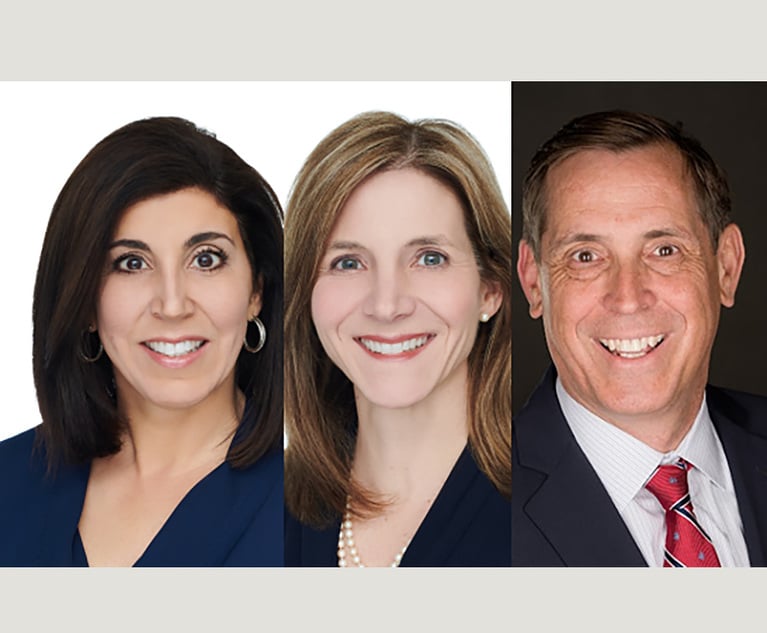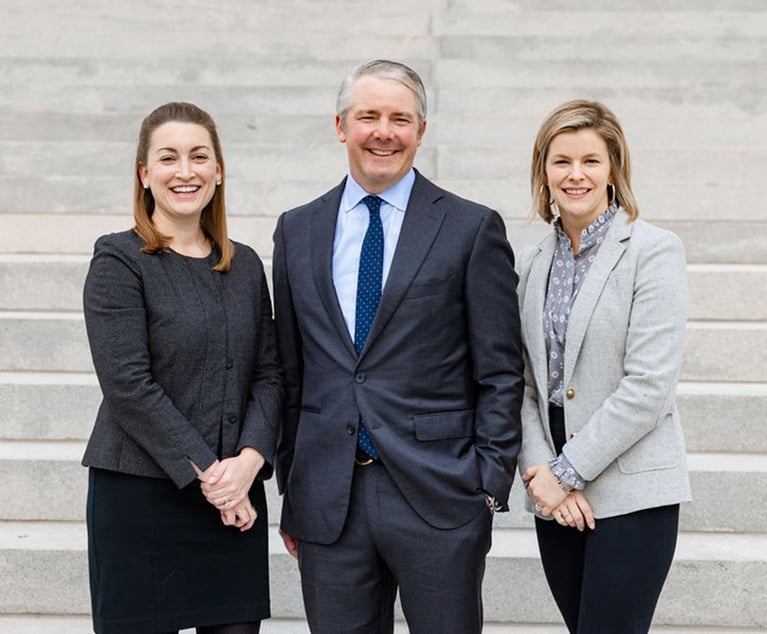Meet the Cleary Gottlieb Partner Who Lobbied for Big Banks on Tax Reform
During a Cleary Gottlieb webinar on Dec. 20, James Duncan began his remarks with a word of caution: “One phenomenon that I would like to avoid is we have to remember that taxes are not the center of the universe,” he said. Lobbying records show Duncan was an advocate recently for Bank of America, Goldman Sachs, JPMorgan Chase and Morgan Stanley.
January 11, 2018 at 12:22 PM
5 minute read
 U.S. Capitol. Credit: Mike Scarcella/ NLJ
U.S. Capitol. Credit: Mike Scarcella/ NLJ
In the run-up to the most sweeping tax overhaul in a generation, big banks turned to a veteran tax partner in New York: James Duncan.
Duncan, a tax partner in Cleary Gottlieb Steen & Hamilton, was hired in November by Bank of America Corp., Goldman Sachs & Co., JPMorgan Chase & Co. and Morgan Stanley & Co. to advise on the tax bill Congress passed in December.
Duncan's role was revealed in federal lobbying disclosures made public this week.
Duncan's long been a lobbying advocate for the Securities Industry and Financial Markets Association, a trade group whose membership includes the four banks. The association first hired him in late 2008 for dealings with the Treasury Department, according to lobbying disclosures.
Cleary Gottlieb's lobbying for the securities association dates to 1999. Since that year, the trade group has paid Cleary Gottlieb nearly $2.5 million for lobbying work, the lobbying disclosures show.
Duncan joined Cleary Gottlieb in 1979 and became a partner in 1988. A proficient French speaker, he was based in the London office from 1992 to 2007. He was on the team that advised SAB on its acquisition of Miller Brewing Co. Duncan reportedly billed at $1,020 an hour, according to a report by The Wall Street Journal in 2011. He did not immediately return a call seeking comment.
Other Cleary Gottlieb lobbying clients have included the Institute of International Bankers, Citigroup Global Markets Inc. and the Government Development Bank for Puerto Rico. In the tax fight, Morgan Stanley, JPMorgan Chase and Goldman Sachs also turned to Capitol Tax Partners and Bank of America had Smith-Free Group on its side.
Here's a snapshot of some of what Duncan's said recently about tax reform.
The need was there.
In a 2015 “alert memorandum” concerning the Obama administration's tax proposals, Duncan said the U.S. tax rules for multinational businesses were “in need of a comprehensive overhaul.”
“There is a risk of being left behind (and of competitive disadvantages for U.S. businesses) if other countries reform their rules and the United States doesn't,” Duncan wrote. “But even in the presence of a broad consensus that change is necessary, the process of getting from here to there will likely be torturous.”
Don't get carried away with grand predictions.
During a Cleary Gottlieb webinar on Dec. 20, Duncan began his remarks with a word of caution: “One phenomenon that I would like to avoid is we have to remember that taxes are not the center of the universe,” he said.
“Businesses are structured the way they are for a variety of corporate finance, commercial and regulatory reasons. Taxes influence things at the margins, but the fact that the system has changed doesn't necessarily tell you anything about how people respond to it,” he said.
Make America, or at least Ohio, great again? Not so fast.
Duncan said trillions of dollars in U.S. company assets are parked overseas. Under the new tax system, will they soon be repatriated? Maybe in some cases, but don't expect a flood of money coming over the border, he said.
“It's a mistake to think that, the instant after tax reform, all or a sizable portion of that money will be brought back and used to build factories in Akron [,Ohio,] and Youngstown [,Ohio,] and make Ohio great again,” Duncan said on the webinar last month. “Businesses will do what they do. Some companies with lots of excess liquidity outside the United States will bring it home. Some companies will redeploy it to do other things. Some companies will repay their indebtedness.”
It's not over yet.
Congress took on tax reform with a single, massive bill—and no one is under the impression that it's perfect. Indeed, it's widely understood that legislative tweaks and guidance from the U.S. Treasury Department will be necessary. With that comes uncertainty.
“With respect to the prospect of changes, some issues are subject to interpretation by the Treasury Department. And I think the Treasury, generally, is expected to be a force for good in trying to make the rules work and come out with guidance about areas where the rules aren't clear,” Duncan said during the December panel discussion. “Some problems will need to be fixed by legislation, and the question that nobody knows the answer to is how quickly will Congress get around to doing it,” Duncan said during the December panel discussion. “Will they be able to function effect to fix clear problems? How quickly will they proceed?”
So how should companies respond?
“You have to think not only about the bill in the form it's in today but how it will be interpreted, how it is likely to be fixed, what you do in the near term versus what you do in the longer term,” Duncan said in December.
Read more:
This content has been archived. It is available through our partners, LexisNexis® and Bloomberg Law.
To view this content, please continue to their sites.
Not a Lexis Subscriber?
Subscribe Now
Not a Bloomberg Law Subscriber?
Subscribe Now
NOT FOR REPRINT
© 2025 ALM Global, LLC, All Rights Reserved. Request academic re-use from www.copyright.com. All other uses, submit a request to [email protected]. For more information visit Asset & Logo Licensing.
You Might Like
View All
‘Issue of First Impression’: New York Judge Clears Coinbase Appeal Amid Crypto Regulatory Clash
4 minute read
DC's Birchstone Moore Combines With Chicago-Founded Wealth Planning Firm
3 minute read

Trending Stories
- 1Courts, Lawyers Press On With Business as SoCal Wildfires Rage
- 2Florida, a Political Epicenter, Is the Site of Brownstein Hyatt's 13th Office
- 3Law Firms Close Southern California Offices Amid Devastating Wildfires
- 4Lawsuit alleges racial and gender discrimination led to an Air Force contractor's death at California airfield
- 5Holland & Knight Picks Up 8 Private Wealth Lawyers in Los Angeles
Who Got The Work
Michael G. Bongiorno, Andrew Scott Dulberg and Elizabeth E. Driscoll from Wilmer Cutler Pickering Hale and Dorr have stepped in to represent Symbotic Inc., an A.I.-enabled technology platform that focuses on increasing supply chain efficiency, and other defendants in a pending shareholder derivative lawsuit. The case, filed Oct. 2 in Massachusetts District Court by the Brown Law Firm on behalf of Stephen Austen, accuses certain officers and directors of misleading investors in regard to Symbotic's potential for margin growth by failing to disclose that the company was not equipped to timely deploy its systems or manage expenses through project delays. The case, assigned to U.S. District Judge Nathaniel M. Gorton, is 1:24-cv-12522, Austen v. Cohen et al.
Who Got The Work
Edmund Polubinski and Marie Killmond of Davis Polk & Wardwell have entered appearances for data platform software development company MongoDB and other defendants in a pending shareholder derivative lawsuit. The action, filed Oct. 7 in New York Southern District Court by the Brown Law Firm, accuses the company's directors and/or officers of falsely expressing confidence in the company’s restructuring of its sales incentive plan and downplaying the severity of decreases in its upfront commitments. The case is 1:24-cv-07594, Roy v. Ittycheria et al.
Who Got The Work
Amy O. Bruchs and Kurt F. Ellison of Michael Best & Friedrich have entered appearances for Epic Systems Corp. in a pending employment discrimination lawsuit. The suit was filed Sept. 7 in Wisconsin Western District Court by Levine Eisberner LLC and Siri & Glimstad on behalf of a project manager who claims that he was wrongfully terminated after applying for a religious exemption to the defendant's COVID-19 vaccine mandate. The case, assigned to U.S. Magistrate Judge Anita Marie Boor, is 3:24-cv-00630, Secker, Nathan v. Epic Systems Corporation.
Who Got The Work
David X. Sullivan, Thomas J. Finn and Gregory A. Hall from McCarter & English have entered appearances for Sunrun Installation Services in a pending civil rights lawsuit. The complaint was filed Sept. 4 in Connecticut District Court by attorney Robert M. Berke on behalf of former employee George Edward Steins, who was arrested and charged with employing an unregistered home improvement salesperson. The complaint alleges that had Sunrun informed the Connecticut Department of Consumer Protection that the plaintiff's employment had ended in 2017 and that he no longer held Sunrun's home improvement contractor license, he would not have been hit with charges, which were dismissed in May 2024. The case, assigned to U.S. District Judge Jeffrey A. Meyer, is 3:24-cv-01423, Steins v. Sunrun, Inc. et al.
Who Got The Work
Greenberg Traurig shareholder Joshua L. Raskin has entered an appearance for boohoo.com UK Ltd. in a pending patent infringement lawsuit. The suit, filed Sept. 3 in Texas Eastern District Court by Rozier Hardt McDonough on behalf of Alto Dynamics, asserts five patents related to an online shopping platform. The case, assigned to U.S. District Judge Rodney Gilstrap, is 2:24-cv-00719, Alto Dynamics, LLC v. boohoo.com UK Limited.
Featured Firms
Law Offices of Gary Martin Hays & Associates, P.C.
(470) 294-1674
Law Offices of Mark E. Salomone
(857) 444-6468
Smith & Hassler
(713) 739-1250










